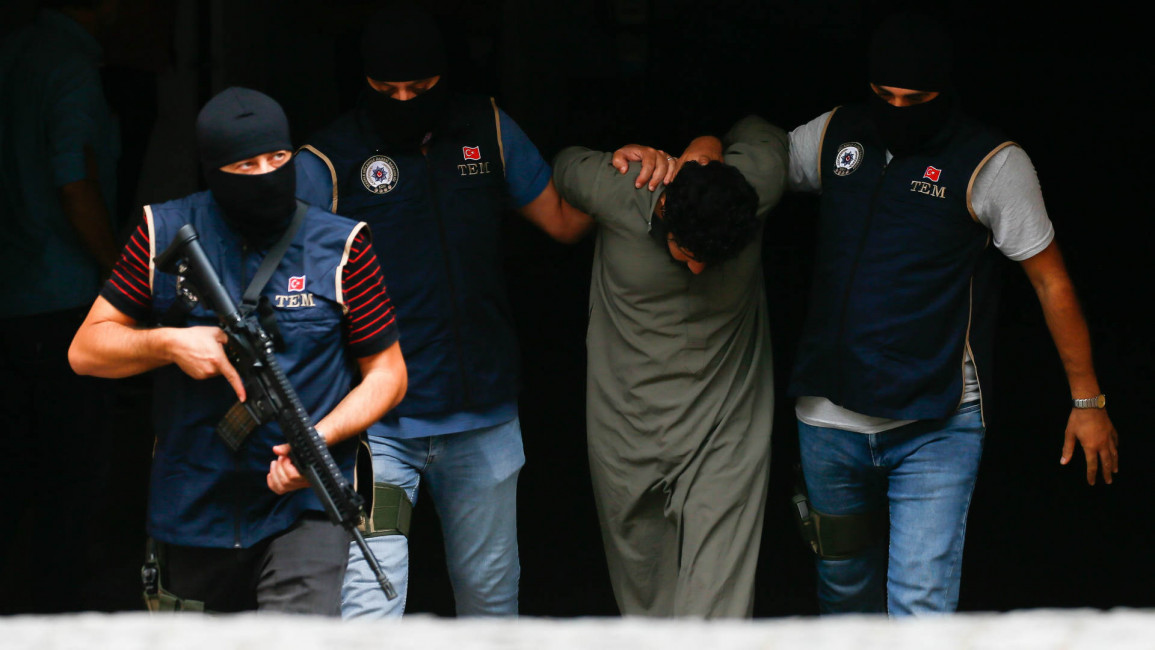Turkey deports 11 French terrorist suspects after Ankara claims it is 'no one's open-air prison'
"Eleven French citizens have been deported to their home country," it said in a statement.
A judicial source in France confirmed that four women and their seven children had arrived in France early on Monday.
Under a 2014 accord between France and Turkey, Paris agreed to take back jihadists trying to return home from Syria via Turkey and incarcerate them at home.
Two of the women returned Monday were already targeted by arrest warrants and will soon face a judge, while the other two were sought by police and have been placed in custody, the French source said.
Another source close to the case said the women had escaped from a camp controlled by Kurdish forces in Syria before being captured by Turkish police.
Ankara has sharply criticised Western countries for refusing to take back citizens who left home to join the Islamic State group (IS) in Syria and Iraq.
It says it has around 1,200 foreign IS members in custody.
The bulk of the foreign jihadists are being held in Syria itself, with thousands languishing in prisons and camps across the country's northeast.
Twitter Post
|
Turkey's interior ministry said last week that 59 "foreign terrorists" have been deported to their home countries since November 11, when it began a new push to expel them.
Of them, 26 were sent back to the United States and Europe.
"Turkey is no one's open-air prison or hotel," said ministry spokesman Ismail Catakli, adding that Turkish authorities would deport all of the suspects.
The deportations came following a period of tension between France and Turkey last week, after French President Emmanuel Macron accused Turkey of working with Islamic State group proxies and demanded Ankara clarify any ambiguities during this week's NATO summit.
"The common enemy today is the terrorist groups. I'm sorry to say, we don't have the same definition of terrorism around the table," Macron told reporters on Tuesday, at a news conference on the sidelines of the NATO summit.
"When I look at Turkey they are fighting against those who fought with us shoulder to shoulder against ISIS [Islamic State] and sometimes they work with ISIS proxies."
IS regroups
Meanwhile, a Pentagon report last month said the Islamic State group took advantage of both the US withdrawal from northeastern Syria and the Turkish incursion to regroup and could prepare new attacks on the West.
President Donald Trump said on October 6 around 1,000 US troops were leaving northeast Syria, where they had kept an uneasy peace between neighbouring Turkey and Syrian Kurdish fighters.
Trump's move allowed an incursion by Turkey aimed at destroying Kurdish guerrillas, who had led the fight against the Islamic State group and run jails for captured extremists in their effectively autonomous area in northern Syria.
Trump, who was strongly criticised even by allies in his own camp, has changed course several times, eventually announcing that a residual force would remain in Syria to protect oil fields.
“ISIS exploited the Turkish incursion and subsequent drawdown of US troops to reconstitute capabilities and resources within Syria and strengthen its ability to plan attacks abroad," the Department of Defence Office of Inspector General said in a report, using a common acronym for the IS group.
The office, which is an independent investigative arm, added that IS "will likely have the 'time and space' to target the West and provide support to its 19 global branches and networks," the report said, citing information provided by the Defen e Intelligence Agency (DIA).
In the long run, it "will probably seek to regain control of some Syrian population centres and expand its global footprint," the inspector general added, citing the DIA.
Already IS has "has activated sleeper cells to increase attacks" against the Kurdish-led fighters of the Syrian Democratic Forces, whom the United States relied upon in the fight against IS.
In 2014 fighters from the newly formed IS group swept through much of the Sunni heartland in Iraq and Syria to declare a "caliphate."
The report states that US forces in Syria continue to arm SDF fighters but have stopped training them. By the end of the third quarter, the SDF had 100,000 fighters, according to the document.
Follow us on Twitter and Instagram to stay connected



